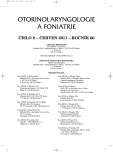-
Medical journals
- Career
Changes in Communication are the Biggest Handicap in Patients with Permanent Tracheostomy
Authors: J. Škvrňáková 1,2; A. Pellant 1,2; P. Mandysová 1,3
Authors‘ workplace: Fakulta zdravotnických studií, Katedra ošetřovatelství, Univerzita Pardubice 1; Klinika otorinolaryngologie a chirurgie hlavy a krku, Pardubická krajská nemocnice, a. s. 2; Klinika neurologická, Pardubická krajská nemocnice, a. s. 3
Published in: Otorinolaryngol Foniatr, 60, 2011, No. 2, pp. 85-90.
Category: Original Article
Overview
Permanent or long-term use of a tracheostomy cannula significantly restricts the patient both physically and in his work activities and it constitutes an important psychological and social burden. In this article, we interpret the results of a research study concerning voice and communication options in patients with a permanent tracheostomy and compare them with the results of our and foreign authors.
The research study was conducted in Pardubice Regional Hospital from June 2004 through May 2007. The group of respondents included 60 patients, who were separated into two groups. Group I consisted of respondents after total laryngectomy (45 patients), and group II consisted of respondents with preserved larynx (15 patients). For patients with a tracheostomy, voice loss was the most significant handicap. Of the total number of respondents, 56.7% indicated that they had feared voice loss. For 82.7% of the patients, voice loss was more burdensome than a tracheostomy cannula. Acquisition of a replacement communication mechanism is important not only for communication but it also has positive effects on the patient’s psyche.Key words:
tracheostomy, communication, handicap, psychological area.
Sources
1. Astl, J.: Otorinolaryngologie a chirurgie hlavy a krku. 1. vyd., Praha, Karolinum, 2002. 137 s., isbn 80-246-0325-X.
2. Attieh, A. Y., Searl, J., Shahaltough, N. H. et al.: Voice restoration following total laryngectomy by tracheoesophageal prothesis: Effect on patients’ quality of life and voice handicap in Jordan. Health and Quality of Life Outcomes (on line), March 2008, s. 1-10, [cit. 2009-02-07]. Z databáze Gale PowerSearch.
3. De Santo, L. W., Olsen, K., D., Perry, W. C. et al.: Quality of life after surgical treatment of cancer of the larynx. Ann. Otol. Rhino. Laryngol., 104, 1995, s. 763-769.
4. Farrand, P., Duncan, F.: Generic health-related quality of life amongst patiens employing different voice restoration methods following total laryngectomy. Psychology, Health Medicine (on line), 12, 2007, 3, s. 255-256 [cit. 2009-02-07]. Z databáze CINAHL.
5. Hybášek, I., Vokurka, J.: Otorinolaryngologie. 1. vyd., Praha, Karolinum, 2006, 426 s., isbn 80-246-1019-1. Kap. 8, Nádory hrtanu, s. 271.
6. Chrobok, V., Astl, J., Komínek, P. a kol.: Tracheostomie a koniotomie. 1. vyd., Praha, Maxdorf, 2004. 170 s., isbn 80-7345-031-3.
7. Kostřica, R., Smilek, P., Hložek, J. a kol.: Současná komplexní léčba nádorů hlavy a krku. 1. vyd., Brno, Masarykova univerzita, 2003, 67 s., isbn 80-210-3061-5.
8. Köhler, G.: Sociologická štúdia chorých po laryngektómii z psychického, sociálneho a somatického aspektu. Československá otolaryngologie, roč. 23, 1974, s. 129-137.
9. Kraus, J., Chovanec, M., Bouček, J.: Karcinom hrtanu - současné trendy. Lékařské listy, roč. 53, 2005, s. 147-150.
10. Locke, B.: Psychology of the laryngectomee. Military Medicine, 131, 1966, s. 593-599.
11. Manicová-Prokešová, S.: Príspevok k psychologii pacientov s Ca laryngu. Lékařské listy. Bratislava, roč. 30, 1950, s. 30-34.
12. Marková, M., Fendrychová, J.: Ošetřování pacientů s tracheostomií. 1. vyd., Brno, NCO NZO, 2006. 101 s., isbn 80-7013-445-3.
13. Novák, J., Hybášek, I., Pellant, A.: Nemocný a totální laryngektomie. In supplementum Sborníku vědeckých prací LF UK v Hradci Králové, 1981, č. 3, s. 92-101.
14. Paleri, V., Wight, R. G., Owen, S. et al.: Defining the stenotic post-laryngectomy tracheostoma and its impal on the quality of life in laryngectomees: development and validation of a stoma function questionnaire. Clinical Otolaryngology (on line), 31, 2006, s. 418-424, [cit. 2009-02-07]. Z databáze EBSCOhost.
15. Praisler, J., Pellant, A., Chrobok, V.: Naše zkušenosti s náhradními fonačními mechanismy po totální laryngektomii. Otorinolaryng. a Foniat. /Prague/, roč. 51, 2002, s. 189-191.
16. Pytela, O.: Chemometrie pro organické chemiky. 2. upr. vyd., Pardubice, Univerzita Pardubice, 1995. 217 s., isbn 80-7194-023-2.
17. Škvrňáková, J.: Úloha ošetřovatelské péče při zvládání psychických a sociálních obtíží nemocných po tracheostomii a po totální laryngektomii. Brno, 2010. Dizertační práce (Ph.D.). Masarykova univerzita, Lékřská fakulta, Ústav sociálního lékařství a veřejného zdravotnictví. 2010-04-21.
18. Tichý, S., Betka, J., Kasík, P.: K otázce resociability pacientů po totální laryngektomii. Československá otolaryngologie, roč. 36, 1987, s. 257-260.
19. Ústav zdravotnických informací a statistiky ČR. Novotvary 2007 ČR (on line). 2011, s. 88 [cit. 2011-01-22]. Dostupné z WWW:http://www.uzis.cz/publikace/ novotvary-2007.
Labels
Audiology Paediatric ENT ENT (Otorhinolaryngology)
Article was published inOtorhinolaryngology and Phoniatrics

2011 Issue 2-
All articles in this issue
- Immunohistochemical Expression of EGFR Oncoprotein and Its Prognostic Significance in Salivary Gland Carcinomas
- Changes in Communication are the Biggest Handicap in Patients with Permanent Tracheostomy
-
Tumour Thrombosis of Internal Jugular Vein
A Case Report and Overview of Its Epidemiologic, Pathogenetic and Clinical Aspects - Multiple Neurofibroma of the Larynx
- Branchio–Oto–Renal Syndrome
- Pendred Syndrome in the Czech Republic
- Extraesophageal Reflux Disease – Interdisciplinary Consensus
- Comparison of Basic Diagnostic Methods (Reflux SymptomIndex, Reflux Finding Score, Therapeutic Trial, pH-metry)
- Otorhinolaryngology and Phoniatrics
- Journal archive
- Current issue
- Online only
- About the journal
Most read in this issue- Changes in Communication are the Biggest Handicap in Patients with Permanent Tracheostomy
- Extraesophageal Reflux Disease – Interdisciplinary Consensus
- Pendred Syndrome in the Czech Republic
-
Tumour Thrombosis of Internal Jugular Vein
A Case Report and Overview of Its Epidemiologic, Pathogenetic and Clinical Aspects
Login#ADS_BOTTOM_SCRIPTS#Forgotten passwordEnter the email address that you registered with. We will send you instructions on how to set a new password.
- Career

